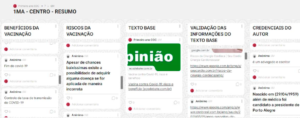News . Best Practices Together against Covid-19 (Best Practice Brazil)

This open scenario practice was carried out during the pandemic by Professor Gabriele Polato Sachinski, in the Portuguese language discipline, on the theme “Together against Covid-19”, at Colégio COC Araucária, a private high school. Students interacted with social scientists, educational researchers, and the local community, including family members. It was supported by APC PUC-PR
CARE: The students were involved in the discussion about the COVID-19 contingency plan. The participants were 47 students, in three classes of 1st year of high school. As a guiding question, the importance of vaccination was worked on to overcome the pandemic of the new coronavirus, together with their families, a teacher, a researcher. Due to the pandemic scenario, it was not possible to have the synchronous participation of experts during the science-action, but activities were developed that sought to involve the family in the debate on scientific issues. To build knowledge and facilitate discussions in the hybrid format, debates were encouraged through virtual learning environments.
KNOW: Interdisciplinary activities were developed, even without the involvement of a biology teacher, for example, when dealing with the importance of vaccination against pandemic diseases, health issues and social well-being. In addition, we worked with the abstract textual genre, its structure and organization. The proposed activities aimed to improve the skills of asking questions, analyzing data, verifying information and sources, weighing arguments, drawing conclusions and sharing ideas. As for the attitudes to be developed, we sought to value public health and social well-being, science and scientific investigation and collaborative work; the notion of collectivity and the consideration of data and information, seeking to verify its reliability, as well as the importance of debate and respect for the collective construction of knowledge.
DO: For the development of this science-action activity, the following activities were carried out:
- Previous conversation (with slideshow support) about the importance of vaccination, vaccines approved in Brazil and their risks and benefits;
- Installation of a virtual wall – the Padlet platform was used for this activity;
- Reading of the selected article, which will be summarized later;
- Verification and verification of the information presented in the article read;
- Sharing of sources consulted on the virtual wall;
- Discussion of researched information and expansion of the repertoire on the topic;
- Work with the characteristics of the summary genre, with the support of slides;
- Presentation of the abstract production proposal.
- Production and sharing of abstracts on the virtual wall.
FINDINGS: The open scenario methodology used was project-based collaborative learning, even in a virtual environment. Students brought their own questions, discussed with the scientists and their families. The fact that the students had devices that allowed the research and assembly of the virtual wall (smartphones, computers, internet, etc.) was fundamental for the development of the activity. In addition, teamwork also contributed to making the activity more interesting for students. It is essential for the teacher to have more ready-made (or easily adaptable) materials, such as videos, podcasts, slides, graphics, etc., to use as support during classes. The discussions carried out through participatory science contributed to a greater awareness of students about vaccination against the coronavirus, and these were shared with the community through the production of a school summary, which was posted on a virtual wall to facilitate access for students. all.
OUTCOMES: The students really enjoyed the activities, as they stimulate debate on topics that are relevant to them. In any case, the proposed activities were carried out in a collaborative way, which contributed to their engagement. It was interesting to see how the students gradually engaged during the activities, especially the debates. At first, there was some reluctance to participate in the discussions, perhaps for fear of not having their position respected or valued. When they realized that their contributions were accepted and taken into account, more and more students decided to present their positions. The students were very interested in the topics under discussion. In addition, they were critical of the researched data, verifying sources and prioritizing information from scientific studies. It was very gratifying to see how much they liked the activity, requesting that other actions be carried out with the same format. Being a content school, it was not possible to dedicate more classes to the activity, which made some steps to be carried out in a reduced way. For this reason, it was also not possible to involve any professor of Natural Sciences – leaving this question to be adapted in future studies and applications. Due to the pandemic, it was not possible to bring outside experts to the school, so we seek texts with scientific credibility and involve the family in the proposed discussions.